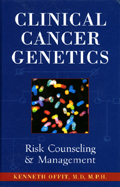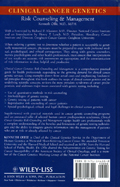Clinical Cancer Genetics: Risk Counseling and Management
Author: Kenneth Offit, M.D., M.P.H. |
Dr. Offit graduated from Princeton University, and received his M.D. and M.P.H. from Harvard. He is currently Chief of the Clinical Genetics Service in the Department of Human Genetics at Memorial Sloan-Kettering Cancer Center. He is actively involved in the research of cancer genetics, and has seen an increase in the use of cancer genetics testing. He, thus, wrote this book to be a guide to all health care professionals, explaining the methodologies of cancer genetics testing, and alerting them to the ethical, psychological and legal issues.
The book is divided into ten chapters, with the first chapter providing an overview of clinical cancer genetics and risk counseling. It explains that the focus of genetics testing is on presymptomatic risk assessment. However, it is fast being used for reproductive risk counseling along with diagnostic and prognostic cancer genetics. The first chapter also details how genetic counseling should be done: what a physical exam should include, how to take a medical history and construct a pedigree, and what a counselor should achieve in a counseling session.
The second chapter describes hereditary risks and acquired risks for cancer. In discussing hereditary risks, the book covers different patterns of inheritance, such as Mendelian inheritance, dominant inheritance, recessive inheritance, X-linked inheritance, and non-Mendelian inheritance. Examples of different cancers that follow these patterns are provided. In discussing acquired risks, factors such as environmental and dietary problems are discussed. Again, examples are provided.
Chapter three is a brief but provides a helpful genetics lesson covering the intricacies of DNA structure, genes, mutations (missense, nonsense and frameshift), tumor suppressor genes, cell cycle, oncogenes, and more. The next chapter lists and explains the common hereditary cancers: breast, ovarian, colon and prostate. It discusses clinical and epidemiologic features, risk factors, pathology and frequency. Chapter five is entitled "Other Cancer Predisposition Syndromes," and is similar to chapter four, but delves into the less common entities that predispose to malignancies listed above.
Chapter six is titled "Quantitative Methods in Cancer Risk Assessment," and it describes the derivation of cancer risk figures. The techniques used are based on "...population-derived (epidemiologic) risks, pedigree-derived (genetic epidemiologic) risks and risks deduced by direct genetic testing." This chapter explains equations and provides tables with risk ratios for different cancers.
Chapter seven briefly describes cancer genetics laboratory tests. A few examples are cytogenetic analysis, Southern and Northern blots, and Polymerase Chain Reaction (PCR). The book does not describe how they are performed, rather, it discusses the theory behind each test, and what purpose they serve.
Chapter eight discusses the fact that genetic testing can affect the management of cancer patients. Prognosis for cancer patients can be affected by tumor-associated and inherited genetic markers. This genetic information can be used along with pathologic and clinical data to shape treatment decisions.
Chapter nine is the shortest chapter, and is entitled "Reproductive Counseling for Cancer Patients and Families." The fact that it is so terse illustrates the main point of the chapter, which is that much more research is needed.
Chapter ten, the final chapter, addresses psychological, ethical, and legal issues in cancer risk counseling. The psychological aspect of genetic counseling was defined by Seymour Kessler, who explained that counseling can be content-oriented or person-oriented. Counselors advocate person-oriented counseling, emphasizing the importance of empathy, respect, positive regard and genuineness. The ethical aspect of genetic counseling was defined by Beauchamp and Childress, with the most emphasized aspect of their theory being the importance of the autonomy of the patient. The book then addresses legal issues, citing different state legislations.
This book is a valuable reference to any health care professional involved in cancer risk counseling. It covers a broad spectrum of topics, and although it can only provide an overview of each subject, it cites references should the reader be interested in learning more.



